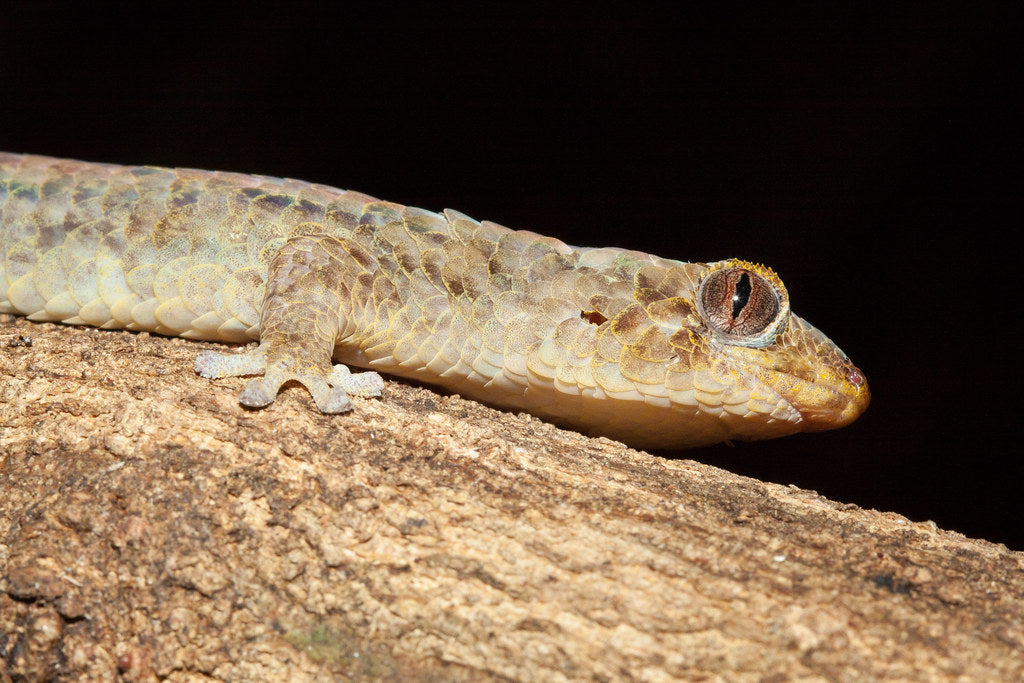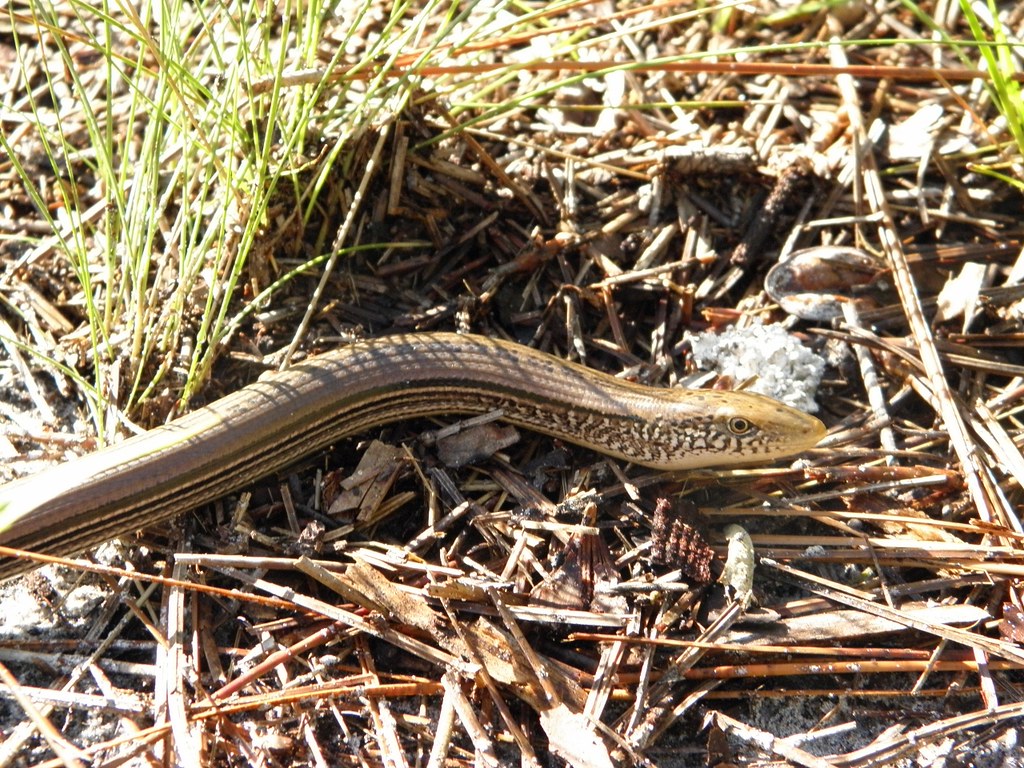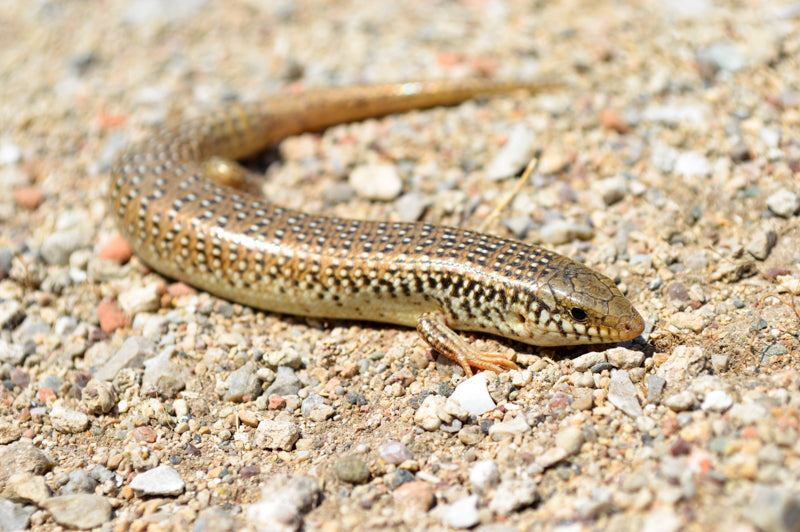Fish scale geckos (Geckolepis sp.) are a group of small, nocturnal, arboreal geckos. They are native to Madagascar and the Comoro islands, where they are most commonly found in trees, but they also inhabit the limestone karst of Ankarana National Park.
Fish scale geckos are generally around 3-5” long, with a large head, large eyes, vertical pupils, plump body and limbs, sticky toe pads, and a thin, tapered tail. Coloring and pattern varies by species, but they are generally light gray with a pattern of darker spots arranged in bands or stripes. The scales have a strongly iridescent sheen. However, what fish scale geckos are best known for is their unusually large scales (thus the common name), and the way they will slough their scales when grabbed in order to escape predators.
Although they’re delicate to handle, fish scale geckos are fairly hardy and easy to care for, making them a beginner-level pet reptile.
How much space do fish scale geckos need?
A single fish scale gecko should be housed in absolutely no smaller than a 12” x 12” x 18” terrarium. Of course, larger is always better!
Cohabitation (keeping multiple fish scale geckos together) is not recommended, and may result in fighting and injuries if attempted.
Do fish scale geckos need UVB?
They are likely to be able to survive without UVB lighting with the right supplementation, but it’s best practice to provide low levels of UVB lighting just to be safe. The best UVB bulb for fish scale geckos is likely to be the Zoo Med ReptiSun 5.0 Compact Fluorescent, 26w. This bulb must be replaced every 6 months to remain effective.
The UVB bulb should be mounted horizontally, housed in a reflective fixture, and placed close to the heat lamp, no less than 3” above the basking branch. UVB is blocked by glass and plastic, so you can’t give your gecko UVB by placing its terrarium in front of an open window. Also make sure that the fixture your UVB bulb is in does not have a clear plastic bulb cover.
Lights should be on for 11 hours/day during winter and 13 hours/day during summer to simulate seasonal changes in day length. This helps regulate hormonal cycles and may improve long-term health.
What basking temperatures do fish scale geckos need?
Fish scale geckos should have a low basking temperature between 80-84°F, as measured by a digital probe thermometer with the probe placed on the basking surface. The cool zone in the lower regions of the enclosure should stay between 68-76°F.
Provide heat for your gecko by imitating the sun with a low-wattage heat lamp placed on one side of the enclosure. If it gets too warm, dial it down with a plug-in lamp dimmer. Do not use ceramic heat emitters (CHEs), red bulbs, or blue bulbs, as these are not as effective.
The heat lamp should be turned off at night, with temperatures dropping no lower than 62°F.
What humidity levels do fish scale geckos need?
Fish scale geckos need a high humidity environment with an average humidity of 60-80%, as measured by a digital probe hygrometer with the probe in the middle of the terrarium.
Misting your gecko’s enclosure with a sprayer every evening and then again in the morning (if necessary) will help create the right humidity levels. It also provides an important source of drinking water! If you need help maintaining appropriately high levels of humidity at night, install a cool mist humidifier connected to a hygrostat.
What substrate is good for fish scale geckos?
Although fish scale geckos are arboreal and don’t spend much time on the ground, placing a layer of substrate on the floor of the enclosure helps maintain humidity and provides a cushion if they fall. As an added perk, it also tends to make the enclosure more attractive.
Ideally, this substrate should resemble what fish scale geckos naturally live on in the wild — in this case, tropical soil. It should have small particles and hold moisture well. We recommend the following substrates for fish scale geckos:
Layering clean, chemical-free leaf litter on top of the substrate can also help with humidity.
Substrate should be at least 2” deep and completely replaced every 3-4 months. Remove poop and urates daily, along with contaminated substrate.
What décor can you use in a fish scale gecko terrarium?
It’s terribly boring for a gecko to be stuck in an enclosure with nothing in it except substrate and food/water bowls. It doesn’t matter how big the enclosure is if you don’t put things in it for your pet to use and interact with. Fish scale geckos appreciate an enclosure with things to climb on and some foliage to provide cover.
Here are some décor ideas that work well with fish scale geckos:
- branches and vines
- cork tubes
- ledges
- live plants (help with humidity)
What do fish scale geckos eat?
Fish scale geckos are primarily insectivorous, which means that in the wild, they mostly eat insects. In captivity, it’s best to feed them primarily live insects, supplemented with high-quality, specially-formulated crested gecko diet (CGD).
How often fish scale geckos need to eat depends on age:
- Hatchlings and Juveniles — insects daily, CGD 2x/week
- Adults — insects 2x/week, CGD 1x/week
One serving of insects is going to be as many as they can eat in 5-10 minutes, each at least slightly smaller than the gecko’s head. CGD should be served in condiment/gecko cups via wall-mounted feeder.
Feeder insects for fish scale geckos: dubias, discoids, red head roaches, crickets, grasshoppers/locusts
Best crested gecko diets: Pangea, Repashy, Leapin’ Leachie, Zoo Med, Lugarti, Black Panther Zoological, Gecko Pro
Remember, the key to great nutrition is variety!
Supplements
Although crested gecko diet doubles as a vitamin supplement, you will need calcium powder to dust on feeder insects. We recommend Repashy Supercal NoD.
Water
Although your gecko will get most of its drinking water from daily mistings, it’s a good idea to also provide a wall-mounted water dish. Change the water daily and scrub the bowl with a reptile-safe disinfectant weekly, or whenever it becomes soiled.
Do fish scale geckos like to be handled?
Few reptiles actually “like” to be held, and fish scale geckos aren’t one of them. Instead of interacting with your gecko by holding it, try hand-feeding it instead with a pair of feeding tweezers. Many keepers report that fish scale geckos are inquisitive and respond well to this taming method!
If you have to grab your gecko for some reason, be VERY gentle — they’re quite delicate, and may slough their scales in the attempt to escape! For this reason, it’s best to use a fine aquarium net rather than your hand.
*This care sheet contains only very basic information. Although it’s a good introduction, please do further research with high-quality sources to obtain additional information on caring for this species.
"Fish-scale gecko (Geckolepis sp)" by Michael Sale is licensed under CC BY-NC 2.0




Leave a comment
This site is protected by hCaptcha and the hCaptcha Privacy Policy and Terms of Service apply.